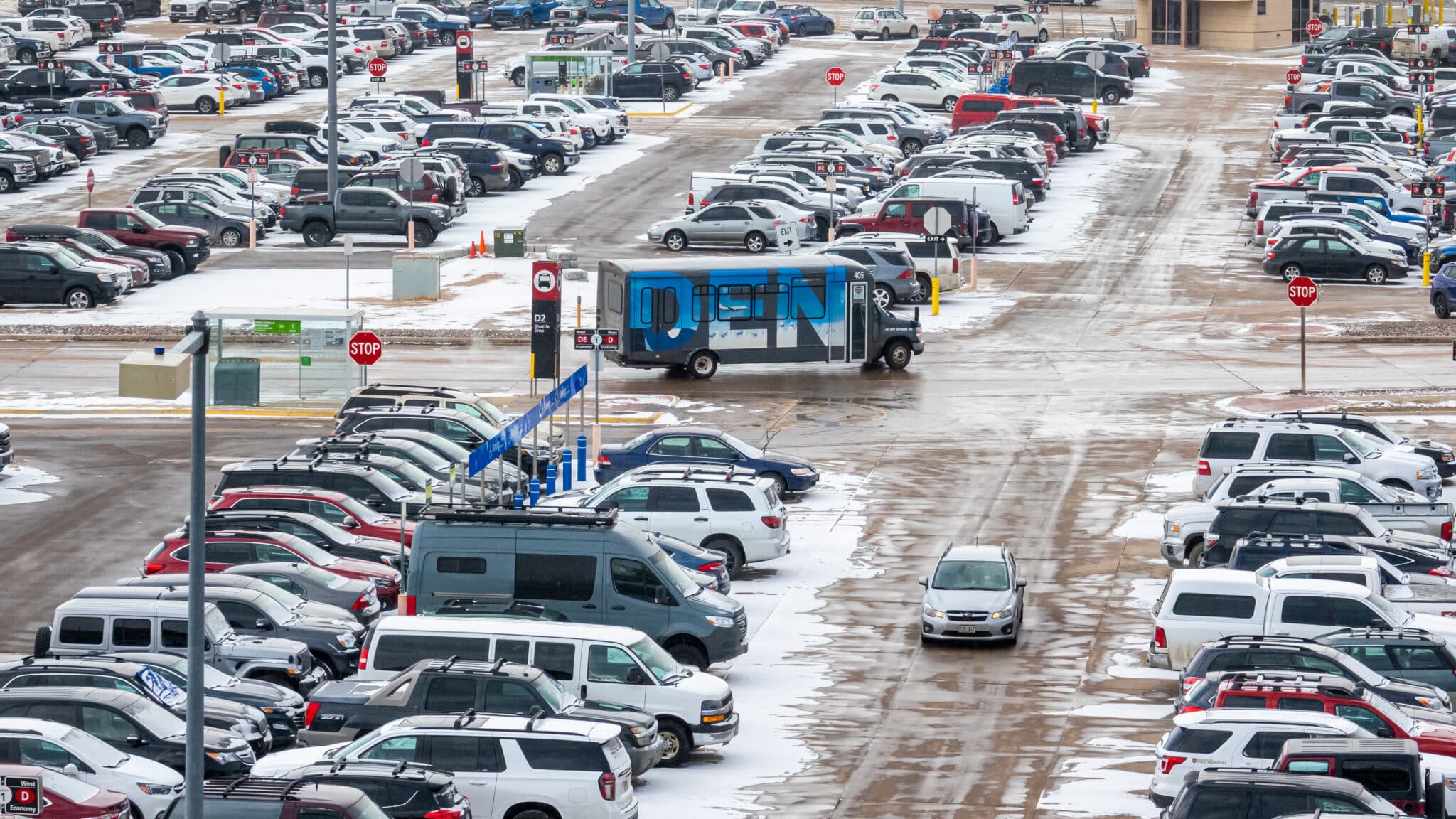
A shuttle bus makes its way through a parking lot at Denver International Airport. (Courtesy DIA)
Turo may need to make room – there’s a new peer-to-peer car rental company driving toward Denver International Airport.
Colorado native Rafael Small founded CarGari in November, and started working to secure a contract to operate at DIA around the same time.
“Seventy-two percent of our customers are coming into the state via the airport and having that presence at the airport, it legitimizes our business operation,” Small told BusinessDen. “Most importantly, it provides immediate access for our services.”

Rafael Small
Peer-to-peer car sharing allows vehicle owners to rent their cars to make some extra cash. For renters, it’s often a cheaper alternative to traditional car rental agencies.
The industry has had a presence at DIA since 2020, when Turo and Avail struck a deal to operate on airport property. DIA made $2.4 million combined off the two contracts last year, up from $1.2 million in 2021, although the contracts with the companies changed somewhat during that period.
Avail has since stopped operating at the airport, according to Mark Nagel, senior vice president of Parking and Commercial Transportation at DIA.
CarGari’s proposed contract calls for the company to pay DIA 10 percent of revenue on rentals that start at the airport. That’s the same arrangement that Turo has.
The proposed contract was forwarded by a Denver City Council committee on Wednesday and will ultimately need to be approved by the full body.
CarGari estimated it will pay $34,000 the first year, increasing to $53,000 and $67,383 in years two and three. But Nagel noted that CarGari is a new company and said the actual revenue will depend on CarGari’s marketing strategies.
CarGari is available only in Colorado, although Small said he’s looking to expand to other western states by year-end. The company has had 392 rentals so far, and expects to hit 2,180 in Colorado by year-end.
“We’re a smaller company, but we have a viable solution to allow your car to make money for you – allowing your depreciating asset to become a commodity,” he said.
Small said he is marketing to minority communities to give them an easy outlet into entrepreneurship. CarGari takes 25 percent of rental revenue and vehicle owners keep the rest.
DIA’s deals with Turo and Avail originally gave the companies dedicated parking spaces, but that’s no longer the case, and CarGari won’t have dedicated spots either. Instead, owners can leave their car in any long-term lot, then communicate with renters via the CarGari site. When renters arrive, they upload pictures of the vehicle to document its condition, and owners unlock it electronically. Renters pay the airport parking fee.
For security reasons, CarGari strongly recommends owners purchase a termination switch, which tracks the vehicle and allows CarGari to disable the car if needed.

A shuttle bus makes its way through a parking lot at Denver International Airport. (Courtesy DIA)
Turo may need to make room – there’s a new peer-to-peer car rental company driving toward Denver International Airport.
Colorado native Rafael Small founded CarGari in November, and started working to secure a contract to operate at DIA around the same time.
“Seventy-two percent of our customers are coming into the state via the airport and having that presence at the airport, it legitimizes our business operation,” Small told BusinessDen. “Most importantly, it provides immediate access for our services.”

Rafael Small
Peer-to-peer car sharing allows vehicle owners to rent their cars to make some extra cash. For renters, it’s often a cheaper alternative to traditional car rental agencies.
The industry has had a presence at DIA since 2020, when Turo and Avail struck a deal to operate on airport property. DIA made $2.4 million combined off the two contracts last year, up from $1.2 million in 2021, although the contracts with the companies changed somewhat during that period.
Avail has since stopped operating at the airport, according to Mark Nagel, senior vice president of Parking and Commercial Transportation at DIA.
CarGari’s proposed contract calls for the company to pay DIA 10 percent of revenue on rentals that start at the airport. That’s the same arrangement that Turo has.
The proposed contract was forwarded by a Denver City Council committee on Wednesday and will ultimately need to be approved by the full body.
CarGari estimated it will pay $34,000 the first year, increasing to $53,000 and $67,383 in years two and three. But Nagel noted that CarGari is a new company and said the actual revenue will depend on CarGari’s marketing strategies.
CarGari is available only in Colorado, although Small said he’s looking to expand to other western states by year-end. The company has had 392 rentals so far, and expects to hit 2,180 in Colorado by year-end.
“We’re a smaller company, but we have a viable solution to allow your car to make money for you – allowing your depreciating asset to become a commodity,” he said.
Small said he is marketing to minority communities to give them an easy outlet into entrepreneurship. CarGari takes 25 percent of rental revenue and vehicle owners keep the rest.
DIA’s deals with Turo and Avail originally gave the companies dedicated parking spaces, but that’s no longer the case, and CarGari won’t have dedicated spots either. Instead, owners can leave their car in any long-term lot, then communicate with renters via the CarGari site. When renters arrive, they upload pictures of the vehicle to document its condition, and owners unlock it electronically. Renters pay the airport parking fee.
For security reasons, CarGari strongly recommends owners purchase a termination switch, which tracks the vehicle and allows CarGari to disable the car if needed.
